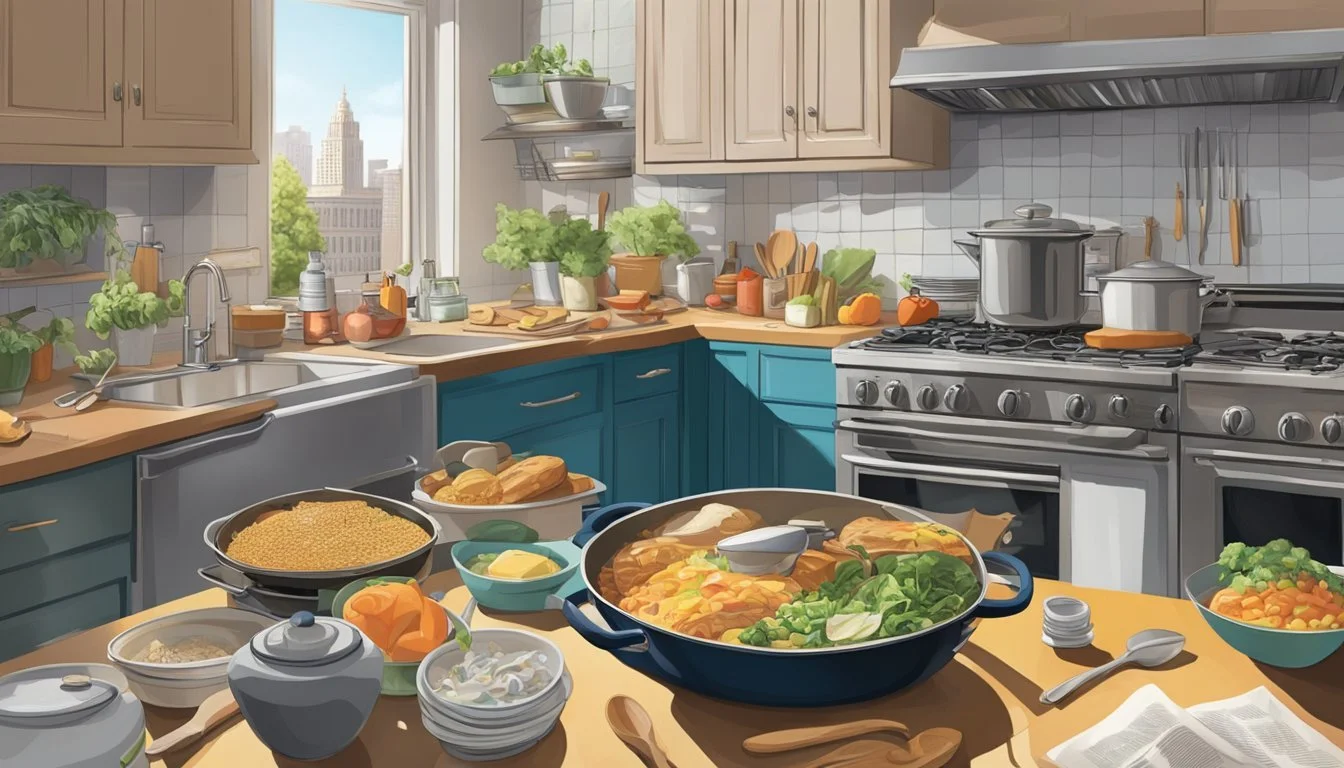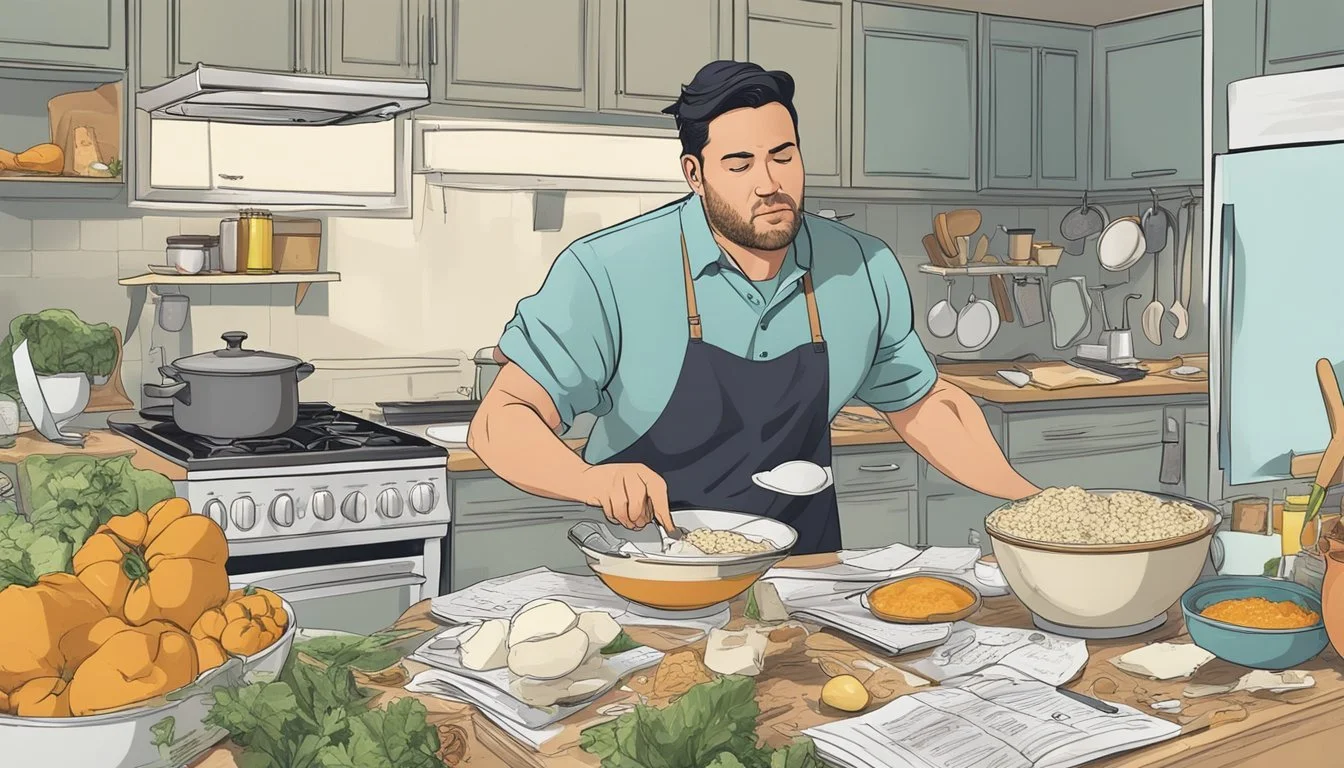How to Cook When You're Feeling Lost in Life
A Guide to Finding Comfort in the Kitchen
Cooking can be a therapeutic and rewarding endeavor, particularly during times when one might feel lost or adrift in life. It offers a form of creative expression and a tangible means to regain a sense of control and accomplishment. For individuals grappling with the sensation of being lost—perhaps due to major life changes, setbacks, or a lack of direction—preparing a meal can serve as a grounding activity. The structure of following a recipe, the sensory involvement of handling ingredients, and the satisfaction of completing a dish can collectively serve as a counterbalance to feelings of uncertainty.
The process of cooking not only engages the mind and body but can also evoke a sense of nostalgia and comfort, connecting one to cherished memories or cultural roots. As individuals navigate through periods when they feel disconnected or confused about their path, the act of cooking can become a beacon of self-care. It further encourages an exploration of personal tastes, interests, and capabilities, which can have a subtle yet impactful influence on one’s journey to finding their footing again.
By channeling focus into the culinary arts, people who feel lost may uncover a passionate interest or simply enjoy a respite from the pervasive sense of disorientation. Cooking offers a pathway to mindfulness, providing an opportunity to momentarily step away from life's complexities, and perhaps, in the process, regain a clearer perspective. It's the simple act of making a meal that can sometimes lead to profound revelations about oneself and the trajectory of their life.
Discovering Purpose in the Midst of Confusion
When life's direction is unclear, the kitchen can be a sanctuary for regaining a sense of control and purpose. Cooking becomes not just a necessity, but a mindful practice that can lead to self-discovery and personal growth.
Contemplating Life's Direction
Contemplating one's life direction is crucial during an existential crisis. Cooking can serve as a metaphorical compass, guiding individuals as they assess their values and identity. The act of preparing a meal requires planning and decision-making, mirroring the process of setting life goals.
Embracing Life Transitions and Major Changes
Life is replete with transitions and changes, often leading to confusion and the search for new meaning. Cooking new recipes or cuisines can parallel the exploration of unfamiliar life territories, fostering adaptability and confidence as one learns to navigate these changes.
The Role of Reflection and Journaling
Taking time to reflect is a form of self-care. Through journaling—one's culinary experiences or personal thoughts—individuals can track their journey, identify patterns, and pinpoint areas for growth opportunities. This reflection can clear the fog of uncertainty, providing a written search for meaning.
Setting Priorities and Goals
When feeling aimless, setting priorities and goals can be a significant step toward regaining direction. In cooking, choosing which recipes to tackle reflects setting life priorities, and mastering a dish reflects the achievement of a goal, thus enhancing personal growth.
Identifying Growth Paths
Growth stems from not only identifying but also seizing growth paths and opportunities. Choosing to learn complex cooking techniques or understanding the nutritional value of food can symbolize the commitment to personal development and establishing a clearer purpose.
Meditation and Mindfulness
The principles of meditation and mindfulness—often practiced through yoga or focused breathing—can be applied to cooking. Attaining a state of flow in the kitchen allows one to be fully present in the moment, reducing fear and fostering a serene mind.
By embracing these practices, individuals can navigate through the confusion and foster a renewed sense of purpose, transforming the kitchen into a place of clarity and direction.
Enhancing Mental and Emotional Well-being
Cooking can be a therapeutic activity that offers various mental and emotional benefits, particularly when one feels lost in life. It provides an avenue for emotional expression and development, and can also serve as a coping mechanism for anxiety and depression. Additionally, cooking fosters resilience and confidence, while enhancing social connections which are critical for emotional support.
Recognizing and Understanding Emotions
Engaging in the process of cooking allows individuals to become more attuned to their emotional state. The act of preparing food can serve as a mindful practice which aids people in identifying and attributing their emotions correctly, be it sadness, grief, or discomfort. Incorporating cooking into one’s routine can help in recognizing suppressed emotions, facilitating a better understanding of oneself.
Coping with Anxiety and Depression
Cooking can be a form of self-care strategy that reduces anxiety and mitigates symptoms of depression. The structure and focus required in cooking provide a distraction that can help alleviate immediate feelings of anxiety. For those dealing with depression, the sense of accomplishment after completing a cooking task can be a small but significant victory that uplifts mood.
Strategies For Coping:
Routine: Incorporating cooking into regular activities to provide stability.
Focus: Concentrating on the recipe can divert attention from stressors.
Creativity: Engaging in creative food preparation to enhance positive emotions.
Building Resilience and Confidence
The process of cooking, with its challenges and triumphs, contributes to building resilience. Each culinary success and even failures teach valuable lessons that strengthen one’s ability to withstand life's adversities. Cooking as a skill also boosts self-esteem and confidence, as individuals gain competence through practice and experience.
Benefits of Cooking:
Skill Development: Each new recipe improves culinary abilities, enhancing self-efficacy.
Self-Esteem Boost: Mastering dishes contributes to a positive self-image and personal growth.
The Impact of Social Connections
Cooking has a powerful impact on strengthening social relationships, which are fundamental for mental health and well-being. Sharing meals is a way of nurturing relationships, offering comfort, and reducing feelings of loneliness. It can turn cooking into communal experiences where support systems are forged and emotional bonds are deepened.
Social Aspects of Cooking:
Sharing: Preparing and eating meals with others bolsters feelings of connectedness.
Support: Kitchen interactions often lead to conversations that build supportive relationships.
Cultivating Joy and Motivation
Cooking when feeling lost can be a source of comfort and a step toward reclaiming joy and motivation in life. In this section, we will discuss practical strategies to rekindle the joy of cooking through engaging activities and mindful practices.
Exploring Hobbies and Interests
To reignite the spark in cooking, they can start by incorporating hobbies and interests into the kitchen. For instance, if they have an interest in gardening, incorporating home-grown herbs and vegetables into their cooking can bring a unique sense of satisfaction and joy. Trying new recipes that relate to a favorite book or movie might also renew one's enthusiasm for cooking.
Developing Healthy Routines
Creating a healthy routine fosters motivation and well-being. They should consider setting a specific time for meal planning and cooking to establish structure. Including exercise and improvements in nutrition within their routine bolsters physical health and enhances the overall cooking experience, as they are more likely to cook nutritious meals when they feel energetic and health-conscious.
Improving Your Environment
The environment significantly influences one's mood and desire to cook. They can make their kitchen more inviting by maximizing natural light or enhancing artificial lighting to make the space brighter and more welcoming. An organized and clean workspace reduces stress and improves the flow of cooking activities.
The Power of Gratitude and Giving
Gratitude can boost one’s motivation. They might keep a gratitude journal, noting how cooking nourishes both body and soul. Volunteering to cook for others or sharing homemade dishes can amplify a sense of purpose and joy, as giving typically enriches the giver's life as much as the recipient's.
Finding Solace in Nature and the Outdoors
Connecting with nature can be powerfully restorative. They should take walks in the woods or local parks to seek inspiration and comfort from the natural world. Integrating elements of nature into meals through the use of fresh, seasonal ingredients can translate the tranquility of the outdoors into their cooking.
Navigating Social and External Pressures
In the journey of cooking one's way through feelings of being lost, it is important to acknowledge the impact of social and external pressures. These influences can significantly shape one’s culinary path and sense of self in the kitchen.
Dealing with Societal Expectations
Societal expectations often dictate a standard of culinary success, pressuring individuals to prepare meals that are elaborate or conform to popular trends. To combat this, one must focus on cooking that reflects their personal values and identity, rather than striving for the approval of others. They should also set realistic expectations for their cooking endeavors, recognizing that every meal does not have to be a gourmet experience.
Personal Values: Stay true to one's intrinsic culinary interests.
Realistic Expectations: Embrace simplicity and authenticity in the kitchen.
Redesigning Your Social Media Interaction
Social media can greatly influence one's perception of cooking, often through a lens of perfectionism. Modifying social media habits can help reduce the pressure to mirror these often-unattainable standards. This might involve:
Curating a feed that includes a diverse range of cooking styles and levels of complexity.
Actively seeking out and engaging with communities that align with one's own cooking style and philosophy.
Seeking External Support and Community
Creating or joining a community that shares similar interests in cooking can offer support and counteract feelings of isolation. Individuals may find solace in:
Joining cooking or food-focused support groups where experiences and recipes can be shared.
Engaging in communal cooking activities which foster connections and help one to rediscover the joy of cooking.
By cultivating relationships within these supportive communities, individuals can regain a sense of belonging and purpose in their culinary journey.
Take Action: Practical Steps Forward
Moving forward when one feels lost can be challenging, but taking decisive action is essential. Similarly, in cooking as in life, the ability to chart a course and tap into resources lays the groundwork for a successful outcome. One must set in motion a clear plan, seek support, and foster an action-oriented mindset.
Creating a Plan to Move Forward
To navigate out of a state of feeling lost, an individual should start by crafting a concrete plan. This plan should outline measurable steps to achieve specific goals, thus injecting structure into their undertakings. For example:
Set Clear Objectives: Determine short-term and long-term culinary goals (learn a new recipe weekly, master five dishes by year’s end).
Itemize Actionable Steps: Break goals into smaller tasks (finding recipes, buying ingredients, allocating time for practice).
Finding Support and Resources
Having a robust support system is critical to propel one from a place of uncertainty:
Seek Culinary Education: Look into local cooking classes or online tutorials to enhance skills.
Leverage Community: Join cooking forums, social media groups, or local clubs where one can exchange ideas, get feedback, and find encouragement.
Adopting a Mindset for Action
Developing a mindset geared towards action can significantly raise one’s confidence and motivation levels. Here’s how:
Cultivate Positivity: Replace negative thoughts with affirmations related to culinary ambitions.
Maintain Mental Health: Manage stress by incorporating mindfulness practices during cooking, which can double as a therapeutic activity.
By methodically implementing these steps, an individual gains direction, bolsters their motivation, and fortifies their confidence in their cooking journey and beyond.
Conclusion
In the journey of cooking when life seems directionless, individuals can find solace and a path forward through reflection and anticipation. A commitment to self-care and personal growth can further enhance their skill set, fostering hope and clarity in the process.
Reflection and Anticipation
An individual reflects on the experiences they've had in the kitchen, acknowledging both their successes and their learning moments. They anticipate future cooking endeavors with a mindset of growth and improvement, understanding that each step in the kitchen is a building block towards greater culinary competence.
Commitment to Self-Care and Personal Development
They prioritize self-care, recognizing that nourishing the body with home-cooked meals (how long do cooked meals last?)is as important as nourishing the mind. Personal development is pursued through the intentional practice of cooking, developing patience, creativity, and technical skills. Through consistent effort, the individual moves forward, equipped with new recipes and the knowledge that they can navigate the challenges of feeling lost with grace.








